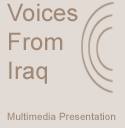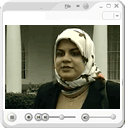
- Afghanistan
- Africa
- Budget Management
- Defense
- Economy
- Education
- Energy
- Environment
- Global Diplomacy
- Health Care
- Homeland Security
- Immigration
- International Trade
- Iraq
- Judicial Nominations
- Middle East
- National Security
- Veterans
|
Home >
News & Policies >
April 2003
|
For Immediate Release
Office of the Press Secretary
April 4, 2003
Life Under Saddam Hussein
Past Repression and Atrocities by Saddam Hussein's Regime
 |
 Life Under Saddam Hussein |
 Escaping from Iraq |
 A Brutal Regime |
When Iraq is free, past crimes against humanity and war crimes committed against Iraqis, will be accounted for, in a post-conflict Iraqi-led process. The United States, members of the coalition and international community will work with the Iraqi people to build a strong and credible judicial process to address these abuses.
Under Saddam's regime many hundreds of thousands of people have died as a result of his actions - the vast majority of them Muslims.
According to a 2001 Amnesty International report, "victims of torture in Iraq are subjected to a wide range of forms of torture, including the gouging out of eyes, severe beatings and electric shocks... some victims have died as a result and many have been left with permanent physical and psychological damage."
Saddam has had approximately 40 of his own relatives murdered.
Allegations of prostitution used to intimidate opponents of the regime, have been used by the regime to justify the barbaric beheading of women.
Documented chemical attacks by the regime, from 1983 to 1988, resulted in some 30,000 Iraqi and Iranian deaths.
Human Rights Watch estimates that Saddam's 1987-1988 campaign of terror against the Kurds killed at least 50,000 and possibly as many as 100,000 Kurds. o The Iraqi regime used chemical agents to include mustard gas and nerve agents in attacks against at least 40 Kurdish villages between 1987-1988. The largest was the attack on Halabja which resulted in approximately 5,000 deaths. o 2,000 Kurdish villages were destroyed during the campaign of terror.
Iraq's 13 million Shi'a Muslims, the majority of Iraq's population of approximately 22 million, face severe restrictions on their religious practice, including a ban on communal Friday prayer, and restriction on funeral processions.
According to Human Rights Watch, "senior Arab diplomats told the London-based Arabic daily newspaper al-Hayat in October [1991] that Iraqi leaders were privately acknowledging that 250,000 people were killed during the uprisings, with most of the casualties in the south." Refugees International reports that the "Oppressive government policies have led to the internal displacement of 900,000 Iraqis, primarily Kurds who have fled to the north to escape Saddam Hussein's Arabization campaigns (which involve forcing Kurds to renounce their Kurdish identity or lose their property) and Marsh Arabs, who fled the government's campaign to dry up the southern marshes for agricultural use. More than 200,000 Iraqis continue to live as refugees in Iran."
The U.S. Committee for Refugees, in 2002, estimated that nearly 100,000 Kurds, Assyrians and Turkomans had previously been expelled, by the regime, from the "central-government-controlled Kirkuk and surrounding districts in the oil-rich region bordering the Kurdish controlled north."
"Over the past five years, 400,000 Iraqi children under the age of five died of malnutrition and disease, preventively, but died because of the nature of the regime under which they are living." (Prime Minister Tony Blair, March 27, 2003) o Under the oil-for-food program, the international community sought to make available to the Iraqi people adequate supplies of food and medicine, but the regime blocked sufficient access for international workers to ensure proper distribution of these supplies. o Since the beginning of Operation Iraqi Freedom, coalition forces have discovered military warehouses filled with food supplies meant for the Iraqi people that had been diverted by Iraqi military forces.
The Iraqi regime has repeatedly refused visits by human rights monitors. From 1992 until 2002, Saddam prevented the UN Special Rapporteur from visiting Iraq.
The UN Special Rapporteur's September 2001, report criticized the regime for "the sheer number of executions," the number of "extrajudicial executions on political grounds," and "the absence of a due process of the law."
Executions: Saddam Hussein's regime has carried out frequent summary executions, including: o 4,000 prisoners at Abu Ghraib prison in 1984 o 3,000 prisoners at the Mahjar prison from 1993-1998 o 2,500 prisoners were executed between 1997-1999 in a "prison cleansing campaign" o 122 political prisoners were executed at Abu Ghraib prison in February/March 2000 o 23 political prisoners were executed at Abu Ghraib prison in October 2001 o At least 130 Iraqi women were beheaded between June 2000 and April 2001
###


